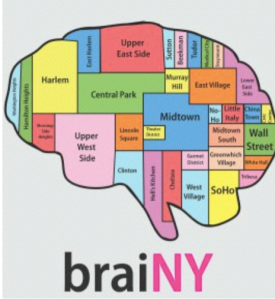Madeline and I enjoy studying the human brain. When we were invited to explore more about the brain at the Zuckerman Institute’s Community Brain Expo at Columbia University Medical Campus last Wednesday in New York City, we hopped a train and set off to learn more about this complex body part we call the brain.
Since we at Chocology obviously love chocolate and the average American consumes 11.7 pounds of chocolate each year, we went on a mission. We already know that chocolate is healthy and that it increases happiness and productivity. But we wanted to discover why our brain apparently craves chocolate! The expo was a great place to begin our search.
It’s quite clear that we love chocolate because it tastes and smells good. It feels so good melting on our tongue. Just the thought of it can create a sense of excitement.
However, what some of us might not realize is that these feelings of pleasure are a direct result of a chemical reaction that takes place in the brain when we eat this sweet treat.
So, what type of chemicals does chocolate have and what do they do in our brains? Well, there are over 380 to be exact! We won’t touch on them all, but here are a few to get you started:
Tryptophan and Serotonin: These chemicals create feelings of relaxation and well-being.
Theobromine: A stimulant that increases blood flow.
Phenylethylamine: The LOVE chemical. This compound stimulates the brain to release dopamine, a neurotransmitter associated with feelings of pleasure and motivation.
Flavonols: Boosts blood flow to key areas of the brain for two to three hours after metabolizing. Creates similar effects to those of a mild aspirin. Flavonols can also be found in foods such as blueberries, green tea and red wine.
Xanthines: A mild stimulant, somewhat like caffeine. Increases wakefulness.
These chemicals, along with many others, create a reaction in our brain, and have numerous and varied effects on our bodies through the nervous system. This is why they contribute to many of the same feelings and sensations we may have when we are dating or falling in love.
So how does this work? Chocolate affect the brain by causing the release of certain neurotransmitters, like dopamine and endorphins. Eating chocolate increases the levels of endorphins released into your brain, resulting in mood elevation along with feelings of reduced stress and even euphoria. Perhaps this is why chocoholics get that lift each time they indulge. And it’s why most of us feel a whole lot better about life after we eat chocolate.
The dopamine signal sent through the reward circuit brings about positive feelings. The frontal lobe of the brain creates a memory of your chocolate eating experience. It then links that to the hippocampus and the hypothalamus creating a good memory of chocolate in your brain.
So when you see or even think about chocolate, your brain searches to see if there are past experiences to draw from. “Should I do that again?” it might ask. Based on your stored memories of the past, the answer will most likely be a resounding, “YES!”
The brain is such a beautiful and mysterious thing. There is so much more to learn about the workings of this complex human organ. Madeline and I are no brain scientists, but we do love learning as much as we can about how we human beings work. I was lucky enough to get the chance to hold a real 3-pound human brain while we were at the brain expo. How amazing is it that this small human organ is the control center of our bodies and still we know so little about its capabilities. We are so glad we got the opportunity to meet the people who study it on a daily basis. We learned a lot and hope you did as well.
To learn more about chocolate and the brain, please visit these links:
http://science.howstuffworks.com/life/inside-the-mind/emotions/chocolate-high2.htm
https://www.psychologytoday.com/blog/the-resilient-brain/201410/dark-chocolate-good-your-brain
Do you know some facts about chocolate and the brain that you’d like to share? Please tell us about them in the comments section, on Facebook or on Twitter.







